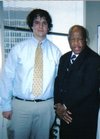Dwight McKissic Gets Moraned
Check out this recent article by Florida Baptist Witness executive editor, James Smith.
The Sandy Creek - Charleston Baptist Analogy
Guilt-by-association? What's the purpose of this article?JACKSONVILLE (FBW)—The Sandy Creek-Charleston Baptists analogy invoked by Dwight McKissic in defense of wider latitude in Southern Baptist life for charismatic theology was first employed by a Baptist church historian in a lecture series that took place in the early days of the Conservative Resurgence—a movement that sought to return the SBC to conservative theology and which the historian opposed.
While McKissic speaks approvingly of the Conservative Resurgence which brought about the current leadership of the Southern Baptist Convention, Walter Shurden delivered a two-part lecture in November 1980, offering a harsh critique of "inerrantists" who in ensuing years would successfully convince Southern Baptists change was needed in their denomination.
Shurden, professor of Christianity at Mercer University, was dean of the School of Theology at Southern Baptist Theological Seminary when he gave the Carver-Barnes Lectures at Southeastern Baptist Theological Seminary.
The lectures were published in the April 1981 issue of the journal, Baptist History and Heritage, which was the source Leon McBeth relied upon in his historical analysis of the Sandy Creek and Charleston Baptists. McKissic rests his historical claims about these 18th century Baptists on McBeth's book, The Baptist Heritage: Four Centuries of Baptist Witness.
Both Shurden lectures criticize the then burgeoning Conservative Resurgence in the SBC which had by then only elected its first two conservative presidents of the denomination—Adrian Rogers (1979) and Bailey Smith (1980). The Resurgence ultimately saw the success of conservatives over moderates in a battle for control of the denomination that dominated the 1980s and part of the 1990s.
In the first lecture, "The Southern Baptist Synthesis: Is it Cracking?", Shurden discusses four traditions that made up the synthesis of modern-day Southern Baptists—the Sandy Creek and Charleston traditions—cited by McKissic in defense of latitude on differences of interpretation concerning spiritual gifts—and the Georgia and Tennessee traditions, arguing, "The synthesis of the Convention was missionary, not doctrinal, in nature." Shurden concludes that "togetherness" marked Southern Baptists as diverse and sometimes contradictory traditions came together in spite of their differences.
"That togetherness is a marvel to those of us on the inside and a mystery to those on the outside. And it is the togetherness, the diversity, the synthesis, which we must receive and confess and forgive. Above all, we must know it. Or there will be no hope for the denomination's future," Shurden said.
In the second lecture, "The Inerrancy Debate: A Comparative Study of Southern Baptist Controversies," Shurden compares the inerrancy debate that fueled the Conservative Resurgence to other doctrinal controversies throughout SBC history. Shurden said, "The unique thing and the most dangerous thing is that we now have for the first time in the Southern Baptist Convention a highly-organized, apparently well-funded, partisan political party who are going not only for the minds of the Southern Baptist people but for the machinery of the Southern Baptist Convention."
Shurden concluded, "Let us hope and let us pray that the Southern Baptist synthesis, so rich in diversity, so flawed by the likes of us sinners, so used by God despite its flaws, shall be sustained."
So Dwight McKissic isn't a *real* conservative because he cites a journal article by Leon McBeth who heavily relied on Shurden's lectures given 27 years ago?
That's asinine. The whole article is asinine.
Apparently, Florida has their own version of Roger Moran as well...
Waco does too.
















